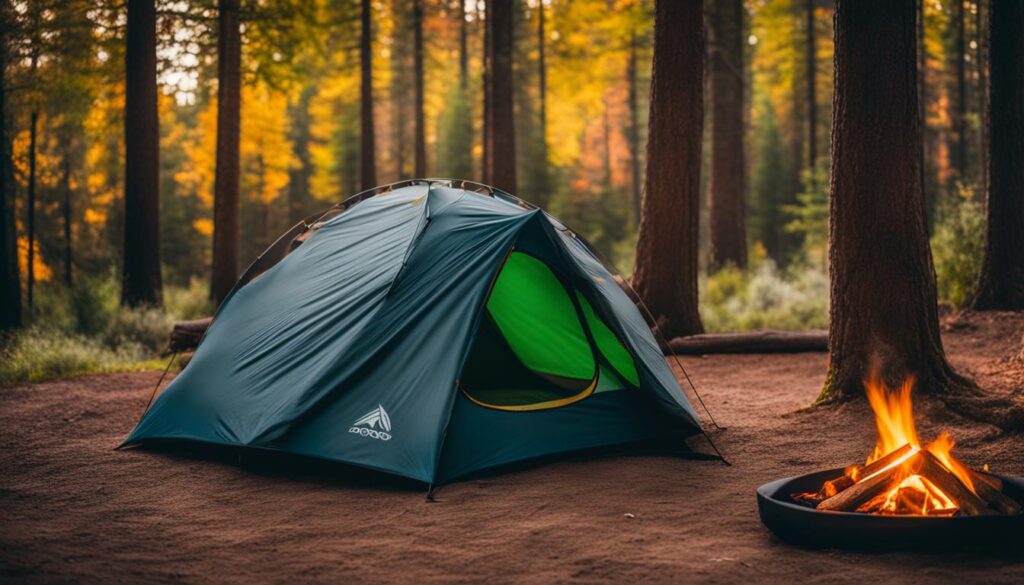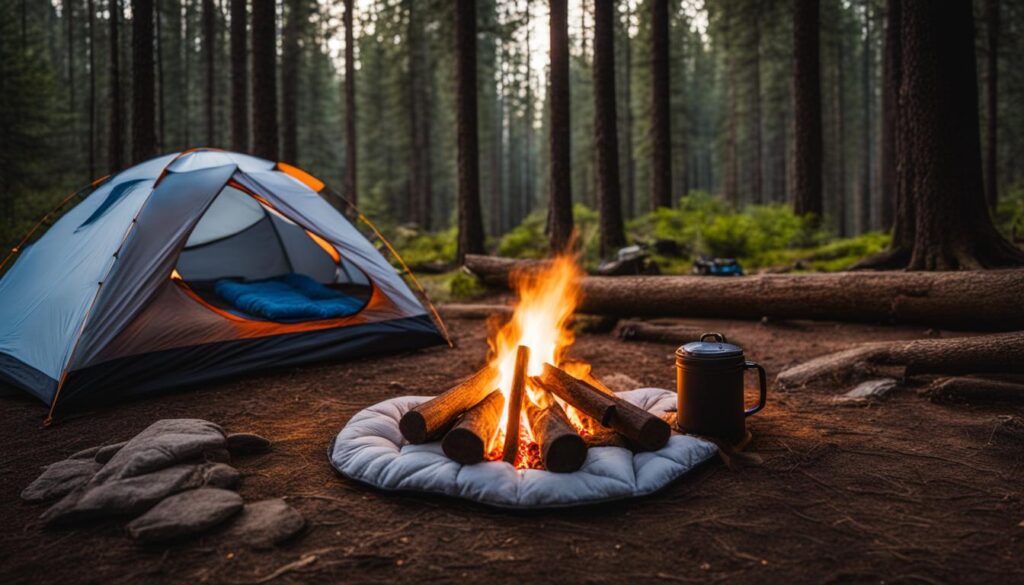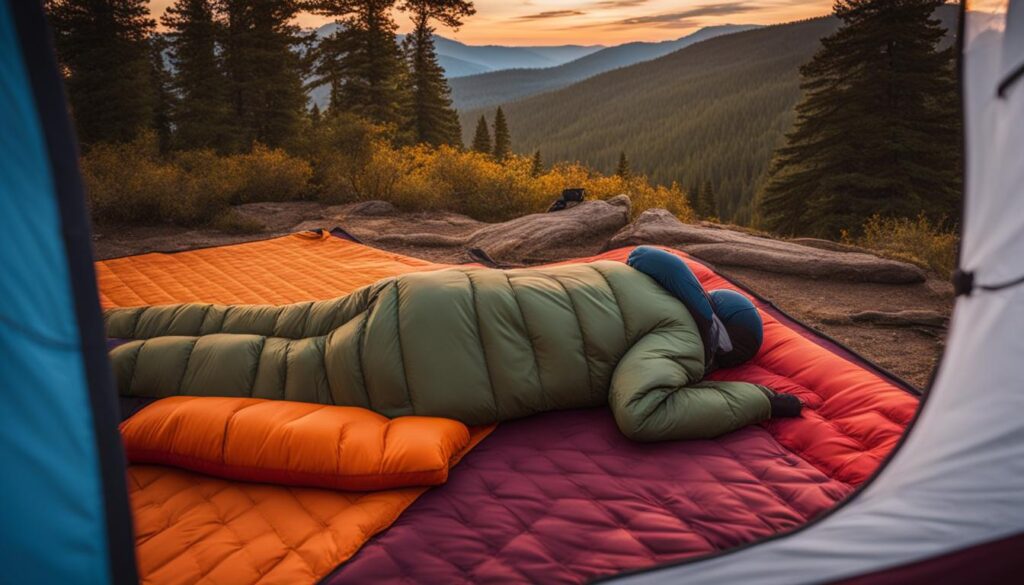Camping gives us the unique opportunity to shed many modern conveniences and enjoy being closer to nature. That doesn’t mean giving up the comfort and rejuvenation of sleep. With the right gear and preparation, we can sleep soundly as well as appreciate starry night skies and fresh air.
Essential gear for sleeping outdoors includes a sleeping bag, sleeping pad, and pillows. It is important to choose the appropriate style and temperature rating for your sleeping bag based on your camping destination. There are three types of sleeping pads—self-inflating, air, and closed-cell foam—each offering different levels of comfort and insulation. Pillows can be brought from home or you can opt for a small foam or inflatable camp pillow.
Key Takeaways:
- Choose a sleeping pad that provides comfort and insulation based on your camping needs.
- Consider bringing a foam or inflatable camp pillow for extra comfort.
- Ensure your sleeping bag is suitable for the temperature of your camping destination.
- Organize your campsite well before dark to create a relaxing environment for sleep.
- Store all food and scented items securely outside of your tent to prevent attracting wildlife.
Tips for Sleeping Comfortably While Camping
To ensure a restful night’s sleep while camping, it is important to make proper preparations. Organizing your campsite well before dark, including setting up your tent and sleeping setup, gives you time to relax and enjoy the evening. Choose a proper tent site that is flat and cleared of debris. It is also helpful to keep a light handy, such as a headlamp or flashlight, to navigate the dark surroundings. Repeat familiar bedtime routines to create a sense of normalcy and bring a familiar bedding item from home for added comfort. Store all food and scented toiletries securely outside of your tent to prevent attracting wildlife. Change into clean, dry sleepwear to ensure a cozy night’s rest. Additionally, consider wearing socks to keep your feet warm during the night.
When it comes to comfortable camping bedding, investing in high-quality sleeping gear for camping is crucial. Here are some camping sleep essentials:
- Sleeping Bag: Choose a sleeping bag that is suitable for the climate and temperature of your camping destination. Look for one that is comfortable, insulated, and has the appropriate season rating.
- Sleeping Pad: A good sleeping pad provides cushioning and insulation from the cold ground. There are various types available, such as self-inflating pads, air pads, and closed-cell foam pads. Consider your comfort and insulation needs when choosing the right one for you.
- Pillows: Don’t forget to bring pillows for added comfort and support. You can bring pillows from home or opt for small foam or inflatable camp pillows that are lightweight and easy to pack.
By following these tips and investing in the right sleeping gear, you can ensure a comfortable and restful night’s sleep while camping. Now, let’s explore some additional tips for staying warm during your camping adventures.
| Benefits of Proper Sleeping Gear for Camping | Brand A | Brand B | Brand C |
|---|---|---|---|
| Comfort | ✅ | ✅ | ✅ |
| Insulation | ✅ | ✅ | ✅ |
| Portability | ✅ | ✅ | ✅ |
| Durability | ✅ | ✅ | ✅ |

In the next section, we will discuss tips for staying warm while camping and how to choose the right sleeping surface. Don’t miss out!
Tips for Staying Warm While Camping
Staying warm during the night is crucial for a comfortable camping experience. On warm nights, you may not require much insulation and can simply tuck your feet into the footbox of your sleeping bag or use a light blanket or sheet. However, for colder weather, it is important to take additional measures. Eating a meal or light snack before bed helps generate internal heat. Avoiding alcohol, which can cause heat loss, is also recommended. Doing some light exercise, such as sit-ups in your sleeping bag, can increase body heat.
Layering clothing is important, but it is advised not to wear bulky clothing inside your sleeping bag as it reduces its ability to efficiently trap body heat. Instead, drape items like jackets on the outside of your bag for added insulation. Adding a closed-cell foam pad beneath your regular sleeping pad provides extra insulation. You can also stuff dry clothing inside your bag to fill empty spaces and reduce the area your body must heat. Placing a warm water bottle close to your core or near your femoral arteries can help warm you up quickly.
Additional Tips
- Wear thermal or moisture-wicking base layers to regulate body temperature and prevent moisture buildup
- Make sure your sleeping bag is zipped up properly to retain heat
- Use a tent with good ventilation to minimize condensation
- Invest in a quality camping sleeping bag rated for colder temperatures
- Consider using hand warmers or heated blankets for extra warmth
- Use a sleeping bag liner to add an extra layer of insulation
“Staying warm during the night is crucial for a comfortable camping experience.”
| Tip | Description |
|---|---|
| Eat a meal or light snack | Generates internal heat and helps keep you warm |
| Avoid alcohol | Alcohol can cause heat loss and negatively impact your ability to stay warm |
| Exercise before bed | Increases body heat and helps keep you warm throughout the night |
| Layer clothing | Properly layering clothing provides insulation without reducing the efficiency of your sleeping bag |
| Use a closed-cell foam pad | Provides extra insulation when placed beneath your regular sleeping pad |
| Place warm water bottle | Close to your core or near your femoral arteries for quick warmth |

Choosing the Right Sleeping Surface
The choice of sleeping surface plays a pivotal role in ensuring a restful night’s sleep while camping. A sleeping pad is essential for insulation and cushioning. You can choose from self-inflating pads, air pads, or closed-cell foam pads based on weight, comfort, and insulation needs.
- Self-inflating pads: These pads offer a good balance of comfort and weight. They have an internal foam core that inflates when the valve is opened, providing cushioning and insulation. They are easy to deflate and roll up for storage and transportation.
- Air pads: If you’re looking for lightweight options, air pads are a great choice. Made of lightweight materials, they provide excellent insulation while minimizing weight. They are inflatable and can be easily adjusted to achieve the desired level of firmness.
- Closed-cell foam pads: These pads are made from dense foam that provides excellent insulation. They are lightweight, durable, and resistant to punctures. Closed-cell foam pads are a popular choice among backpackers due to their compactness and reliability.
For car campers who prioritize comfort, an inflatable air mattress can provide the feel of sleeping in a regular bed. It is important to choose a mattress that is puncture-resistant and offers insulation against the cold ground. Look for models with reinforced construction and features like built-in air pumps for convenience.
Remember, the right sleeping surface can make all the difference in your camping experience, providing you with the comfort and support you need for a good night’s sleep.

Comparison of Camping Sleeping Surfaces
| Sleeping Surface Type | Features | Weight | Comfort | Insulation |
|---|---|---|---|---|
| Self-Inflating Pads | Internal foam core, inflates when valve is opened | Medium | Good | Moderate |
| Air Pads | Inflatable, adjustable firmness | Lightweight | High | Moderate |
| Closed-Cell Foam Pads | Dense foam construction | Lightweight | Moderate | Excellent |
| Inflatable Air Mattress | Puncture-resistant, insulation against cold ground | Varies | High | Varies |
Sleeping Gear for Camping: Additional Tips
When it comes to camping sleeping equipment, there are a few extra items that can enhance your comfort and ensure a peaceful night’s sleep under the stars. To block out any unwanted light or noise, consider packing an eye mask and earplugs. These can be especially useful if you’re camping in areas with ambient light or noisy surroundings. Additionally, listening to podcasts or soothing music can help relax your mind and drown out any distractions.
Staying hydrated is important, even while you sleep. Keep a water bottle within reach of your sleeping bag to quench your thirst during the night. It’s also a good idea to familiarize yourself with the location of the nearest toilet or designated area for going to the restroom. This way, you won’t have to stumble around in the dark when nature calls.
To ensure proper ventilation and minimize condensation in your tent, make use of the vents. Proper air circulation can help prevent that chilly feeling caused by excess moisture. Additionally, if you rely on a CPAP machine for a good night’s sleep, there are travel-friendly options available specifically designed for camping. These portable CPAP machines allow you to maintain your sleep routine, even in the great outdoors.
FAQ
What is the best thing to sleep on when camping?
The best thing to sleep on when camping is a combination of a good sleeping bag, a comfortable sleeping pad, and pillows. These ensure insulation, cushioning, and head support for a restful sleep.
What are some tips for sleeping comfortably while camping?
To sleep comfortably while camping, it’s important to organize your campsite before dark, choose a flat tent site, bring familiar bedding from home, change into clean sleepwear, and wear socks to keep your feet warm.
How can I stay warm while camping?
To stay warm while camping, eat a meal or snack before bedtime, avoid alcohol, do light exercise to generate body heat, layer clothing outside your sleeping bag for insulation, add a closed-cell foam pad for extra insulation, and use a warm water bottle near your core or femoral arteries.
What are the options for camping sleeping pads?
There are three types of camping sleeping pads: self-inflating pads, air pads, and closed-cell foam pads. Each offers different levels of comfort and insulation, so you can choose based on your weight, comfort, and insulation needs.
Are there any additional tips for sleeping comfortably while camping?
Yes, consider bringing an eye mask and earplugs to block out light and noise, pack a water bottle next to your sleeping bag, familiarize yourself with the nearest restroom before bed, use the vents in your tent for air circulation, and for those who require a CPAP machine, there are travel-friendly options available.

